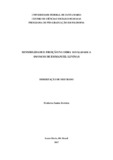| dc.creator | Ferreira, Frederico Santos | |
| dc.date.accessioned | 2018-09-26T19:02:19Z | |
| dc.date.available | 2018-09-26T19:02:19Z | |
| dc.date.issued | 2017-03-31 | |
| dc.identifier.uri | http://repositorio.ufsm.br/handle/1/14401 | |
| dc.description.abstract | The purpose of this dissertation is to present Emmanuel Levinas (1906-1995) conception the concept of sensibility and fruition in the work, Totality and Infinity: an essay on exteriority of 1961.We will try to understand its unintentional movement which takes the sensibility as an element human being that animates consciousness as the intentionality of fruition in this way the conduction of the research will have as problematic interior life of the Levinasian subject, that is his immanence. Thus we need to understand the criticism that the author makes philosophy based on a representation, on the objectification of knowledge. The world in which we live is not given to us as a tool, but as food, because we enjoy the world, from living and not from the consciousness of our relationship with the world is a first experience, therefore, the need of the body, indigent and naked makes us go out in search of the satisfaction, the joy that comes from the mouth. The valorization of the selfhood of the self that takes the affection as the constructor of human subjectivity, defining sensibility as an element of feeling and not of experience. Therefore, it is necessary to rethink the philosophy that is constituted from an absolute self, philosophy of the same, objectification of knowledge, to a philosophical knowledge that is open, always current, that values the sensitive presence, next to the elements. In this way, we must understand the human being as a separate subject, which enjoys as a single subject, sensibility always exposed to the possibility of happiness. | eng |
| dc.language | por | por |
| dc.publisher | Universidade Federal de Santa Maria | por |
| dc.rights | Attribution-NonCommercial-NoDerivatives 4.0 International | * |
| dc.rights.uri | http://creativecommons.org/licenses/by-nc-nd/4.0/ | * |
| dc.subject | Levinas | por |
| dc.subject | Fruição | por |
| dc.subject | Sensibilidade | por |
| dc.subject | Separação | por |
| dc.subject | Representação | por |
| dc.subject | Levinas | eng |
| dc.subject | Fruition | eng |
| dc.subject | Sensibility | eng |
| dc.subject | Separation | eng |
| dc.subject | Representation | eng |
| dc.title | Sensibilidade e fruição na obra Totalidade e infinito de Emmanuel Levinas | por |
| dc.title.alternative | Sensibility and fruition in the work Totality and infinity of Emmanuel Levinas | eng |
| dc.type | Dissertação | por |
| dc.description.resumo | O propósito desta dissertação consiste em apresentar o modo como Emmanuel Levinas (1906-1995) concebe o conceito de sensibilidade e fruição na obra Totalidade e Infinito: ensaio sobre exterioridade de 1961. Pretenderemos compreender seu movimento não-intencional, que toma a sensibilidade como elemento humano que anima a consciência, como intencionalidade da fruição. Desta forma, a condução da pesquisa vai ter como problemática a vida interior do sujeito levinasiano, ou seja, a sua imanência. Assim, precisaremos entender a crítica que o autor faz a filosofia baseada numa representação, na objetivação do conhecimento. O mundo em que vivemos não nos é dado como utensílio, mas como alimento, pois fruímos do mundo, a partir do viver de e não da consciência de, assim, a nossa relação com o mundo é uma primeira experiência de alteridade, pois, a necessidade do corpo, indigente e nu faz com que saiamos em busca da satisfação, do gozo que se dá pela boca. A valorização da ipseidade do eu que toma a afecção como construtora da subjetividade humana, definindo a sensibilidade, como elemento do sentimento e não da experiência. Logo, é preciso repensar a filosofia que se constitui a partir de um eu absoluto, filosofia do Mesmo, objetivação do conhecimento, para um saber filosófico que seja aberto, sempre atual, que valorize a presença sensível, junto aos elementos. Desta forma, deveremos compreender o ser humano como um sujeito separado, que frui no mundo, no puro egoísmo do eu, sujeito solitário e ateu, que se revela como sujeito único, sensibilidade sempre exposta à possibilidade da felicidade. | por |
| dc.contributor.advisor1 | Grzibowski, Silvestre | |
| dc.contributor.advisor1Lattes | http://lattes.cnpq.br/6586514798766408 | por |
| dc.contributor.referee1 | Fabri, Marcelo | |
| dc.contributor.referee1Lattes | http://lattes.cnpq.br/9122803302644811 | por |
| dc.contributor.referee2 | Alves, Marcos Alexandre | |
| dc.contributor.referee2Lattes | http://lattes.cnpq.br/1846296125125082 | por |
| dc.creator.Lattes | http://lattes.cnpq.br/0961409825075019 | por |
| dc.publisher.country | Brasil | por |
| dc.publisher.department | Filosofia | por |
| dc.publisher.initials | UFSM | por |
| dc.publisher.program | Programa de Pós-Graduação em Filosofia | por |
| dc.subject.cnpq | CNPQ::CIENCIAS HUMANAS::FILOSOFIA | por |
| dc.publisher.unidade | Centro de Ciências Sociais e Humanas | por |



